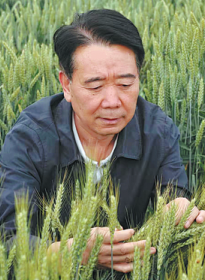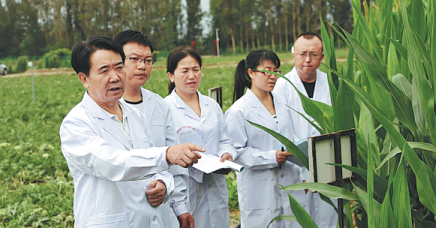For Ma Zhongming, an effective proposal must come from practical experience in farmlands rather than studies of papers or office work.
Ma, dean of the Gansu Academy of Agricultural Sciences and a member of the National Committee of the Chinese People's Political Consultative Conference, said he revised his proposals to the 13th National Committee of the CPPCC by spending every day in the office during the Spring Festival holiday in February.

Ma Zhongming, dean of the Gansu Academy of Agricultural Sciences, checks the growth of crops. [Photo/China Daily]
This year, during the fifth session of the 13th National Committee of the CPPCC, Ma presented proposals including incorporating germplasm resource and base resource banks into national key projects; establishing an improved technical system to support the seed breeding; and accelerating the research and development of seed and seedling breeding of Chinese herbal medicines.
"Acting as a CPPCC National Committee member for two terms, my proposals always come from farmlands and workshops. I have also evaluated and studied the implementation and improvement of policies involving the seed industry to make my proposals more profound and valuable," Ma said.
As a doctoral supervisor, Ma engages in the study and promotion of crop fertilizers, water-saving and high-yield production.
"Just like agricultural research, it's necessary to work in farmlands to do this job well," Ma said.
Ma said he spends at least one-third of his time conducting outdoor investigations every year.
"Only by approaching the sites can I find the truth and then come up with targeted proposals," he said.
The country has attached importance to the development of the seed industry. Seed security is a topic that Ma has followed in recent years.
As a seed industry base in the country, Gansu produces more than 500,000 metric tons of maize hybrid seeds annually, providing more than 55 percent of maize seeds for sowing across the country.
Every August to September during the maize pollination period when the weather is hot, Ma starts visiting farmlands.
Despite the humid and muddy conditions and itching caused by pollen, Ma sticks to the fields to inspect plant diseases and insect pests.
"I do this to learn about the information firsthand from farmers, businesses and the production field that can reveal specific ways to fix problems and difficulties," Ma said.

Ma (front) works with his team at a farm. [Photo/China Daily]
In 2021, Ma and his students started a topic on suggestions to build Gansu as a powerhouse for the seed industry. It led them to travel around the province to inspect seeds development including corn, melons, potatoes, oilseed rape and herbs.
During the tour, Ma said he received feedback from private businesses. They told him they have difficulties in developing the seed industry due to talent shortages and market risks.
"Gansu is a large province but not a strong one in the seed industry," Ma said.
"We have analyzed the causes and made proposals in conducting protection and evaluation of seed resources and promoting the construction of a standard monitoring system for seed quality," he said.
Last year, Ma advised strengthening the construction of the seed and seedling breeding system for Chinese herbal medicines, which was included as a proposal to be handled by the CPPCC National Committee.
"It is an honor and a duty for me to contribute to the industrialization and modernization of Chinese herbal medicines and promote it on the world stage," Ma said.